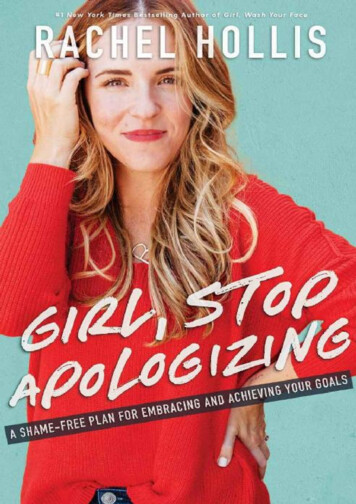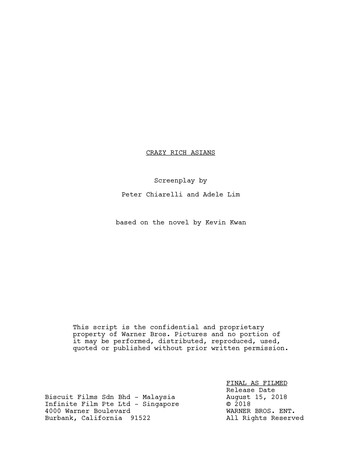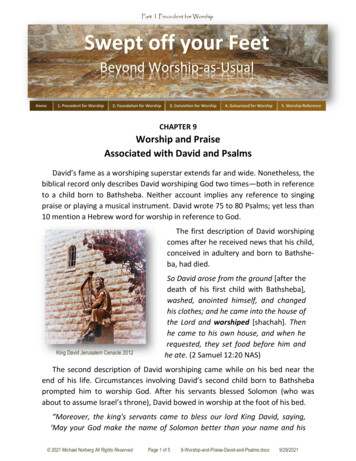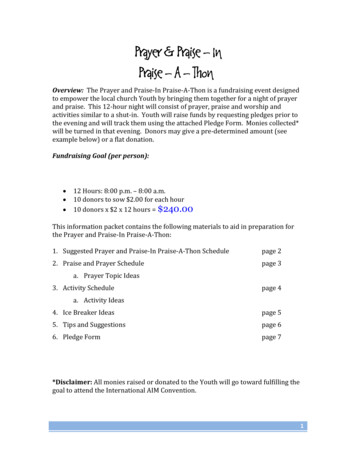
Transcription
PRAISE FOR RACHEL HOLLIS AND GIRL, STOPAPOLOGIZING“Rachel Hollis is a live-out-loud leader with a heart for helping womentenaciously chase their purpose and dreams without apology. Rachel’sability to share stories and principles with raw honesty inspires her readersto discover and take the practical steps that will put them on a lifelong pathof personal growth.”—Dr. John C. Maxwell, author and leadership expert“Ever felt stuck? Ever struggled to make time for your dreams—orstruggled even to admit those dreams to yourself? In Girl, StopApologizing, Rachel Hollis points out the pitfalls, challenges, and excusesthat stop us from achieving our aims. She speaks with refreshing (andoften hilarious) candor about her own experiences and mistakes, and offersconcrete advice about how to create the lives we want.”—Gretchen Rubin, New York Times bestselling author of TheHappiness Project“Girl, Stop Apologizing is the life-changing guide (and permission!) we’veall needed to dump our excuses, embrace our dreams, set boundaries, andgain real confidence and momentum in life. It’s how to overcome a‘lifetime of people pleasing’ and start crafting the vibrant, authentic lifeyou deserve. This is a must-read for taking your destiny into your ownhands. I loved every page!”—Brendon Burchard, #1 New York Times bestselling authorof The Millionaire Messenger, The Motivation Manifesto, and HighPerformance Habits“Reading Girl, Stop Apologizing is like sitting down with a best friendwho can speak deeply into the dark places you’ve been trying to hide andshines a light on them. Rachel has the ability to help you silence your innermean girl while encouraging you to believe that you truly can change and2
become the woman you’ve always envisioned yourself to be. Rachel’s giftis in giving you permission to not feel alone or ashamed of where you’vebeen, while also giving you hope and a plan for what’s ahead of you. Hervoice in my ear has been a guiding light to pursue greatness and more forthis one life I am living.”—Jenna Kutcher, photographer, podcaster, educator, andhost of The Goal Digger Podcast“Rachel is the modern-day Oprah and female Tony Robbins! She providesa safe place for women to dream big and believe in themselves, while alsogiving the tough love all great moms give to their kids to take ownershipof their life and providing the keys to succeed. Rachel is raw, real, and fullof life. She combines emotion, humor, and straight-talk to make all of usbelieve and see how we can have the life we want if we’ve invested thetime and learned how to get there. Get this book and stop apologizing!”—Lewis Howes, New York Times bestselling author and hostof The School of Greatness podcast“Though energy-evoking, motivation alone isn’t enough to actually movethe needle in your life. Rachel Hollis gets this at the deepest level possible.Girl, Stop Apologizing is a true masterpiece that combines heartfeltinspiration with the perfect mix of tools and a framework that can allowyou to effectively adopt new behaviors and skills in your life that createreal and lasting change.”—Dean Graziosi, New York Times bestselling author,entrepreneur, and investor“Rachel Hollis is a force of inspiration who is impacting the world on amassive level. Her unapologetic message of self-worth will continue totransform lives for many decades to come.”—Trent Shelton, author, motivational speaker, and founderand CEO of RehabTime“Rachel is the leader in modern-day personal development for a reason.Her authenticity, vulnerability, and experience separate her from everyoneelse. She just knows how to ‘get real’ in a way that is unapologeticallyRachel.”—Ed Mylett, entrepreneur, personal development coach,3
speaker and host of the Ed Mylett Show podcast“Girl, Stop Apologizing is an unflinchingly relatable manifesto that is asunapologetic as it gets. Each chapter is an espresso shot that kickstartsyour ‘can-do-itude’ and challenges you to reach further and higher toachieve your goals.”—Arlan Hamilton, founder and managing director ofBackstage Capital“It’s time to truly embrace your greatness, and there is no better rally crythan Girl, Stop Apologizing. Unapologetic herself, Rachel is the fearlessgirlfriend you need to help you leap into the bold unknown and fulfill thatbig audacious goal you have been waiting to achieve. And that’s amovement I’m thrilled to be a part of.”—Amy Porterfield, online marketing expert4
5
2019 by Rachel HollisAll rights reserved. No portion of this book may be reproduced, stored in aretrieval system, or transmitted in any form or by any means—electronic,mechanical, photocopy, recording, scanning, or other—except for briefquotations in critical reviews or articles, without the prior writtenpermission of the publisher.Published by HarperCollins Leadership, an imprint of HarperCollinsFocus, LLC.Illustrations created by Annie Ludes.ISBN 978-1-4002-0961-3 (eBook)ISBN 978-1-4002-0960-6 (HC)ISBN 978-1-4002-1506-5 (IE)Epub Edition January 2019 9781400209613Library of Congress Cataloging-in-Publication DataLibrary of Congress Control Number: 2018957777Printed in the United States of America19 20 21 22 23 LSC 10 9 8 7 6 5 4 3 2 16
Information about External Hyperlinks in this ebookPlease note that endnotes in this ebook may contain hyperlinks to externalwebsites as part of bibliographic citations. These hyperlinks have not beenactivated by the publisher, who cannot verify the accuracy of these linksbeyond the date of publication.7
For my daughter, Noah.May you live your life—without apology—incelebration of who God created you to be.8
CONTENTSIntroduction: What If . . .PART I: EXCUSES TO LET GO OFEXCUSE 1:EXCUSE 2:EXCUSE 3:EXCUSE 4:EXCUSE 5:EXCUSE 6:EXCUSE 7:EXCUSE 8:EXCUSE 9:That’s Not What Other Women DoI’m Not a Goal-Oriented PersonI Don’t Have TimeI’m Not Enough to SucceedI Can’t Pursue My Dream and Still Be a GoodMom/Daughter/EmployeeI’m Terrified of FailureIt’s Been Done BeforeWhat Will They Think?Good Girls Don’t HustlePART II: BEHAVIORS TO ADOPTBEHAVIOR 1:BEHAVIOR 2:BEHAVIOR 3:BEHAVIOR 4:BEHAVIOR 5:BEHAVIOR 6:BEHAVIOR 7:Stop Asking PermissionChoose One Dream and Go All InEmbrace Your AmbitionAsk for Help!Build Foundations for SuccessStop Allowing Them to Talk You Out of ItLearn to Say NoPART III: SKILLS TO ACQUIRESKILL 1:SKILL 2:PlanningConfidence9
SKILL 3:SKILL 4:SKILL 5:SKILL onclusion: Believe in Your Dang Self!AcknowledgmentsAbout the AuthorNotes10
INTRODUCTIONWHAT IF . . .When I originally started writing this book I fully planned on calling itSorry, Not Sorry. And, yes, I was basing that title on a Demi Lovato song.In fact, I’d go so far as to say that the song was the impetus for this entirebook.Imagine, if you will, the late summer of 2017 when I first heard thisjam. It was a sunny Monday morning. I know it was Monday morningbecause my entire staff was dancing around our conference table, pumpingthemselves up for our weekly kickoff meeting. And I know it was sunnybecause it was summertime in Los Angeles—the exorbitant property taxesensure that the climate will never fall below a balmy seventy-threedegrees.We always dance it out before big meetings because it brings up ourenergy and gets us in the right headspace. Each week (to keep things fair)we rotate the role of house DJ, the person on our team who gets to pick ourpump-up music. That summer, the entire staff (besides me) was undertwenty-eight, so it was a millennial box of chocolates—you never knewwhat you were going to get. On that particular Monday I heard the songfor the first time.It was love at first listen.If you’ve never rocked out to this particular piece, you should add it toyour workout playlist immediately. It’s upbeat and fun and irreverent tothe point of challenge—the exact kind of inspiration you want before anintense cardio session or a first run in the local mayoral election.Demi lets us know that she’s looking great and feeling great and livingher life on her own terms. And she’s sorry, but she’s not sorry. I live forthis kind of jam. It’s poppy and catchy and easily fits in the arsenal ofmusic I use to give myself energy or alter my mood.11
After that first experience, I quickly developed a song crush. I listenedto it in the shower, at the gym, in the car—I even went so far as to play theKidz Bop version when my children were around so I could keep it inrotation. I mean, that’s commitment, you guys! Anyone who has eversuffered through Kidz Bop can attest that it’s the seventh circle ofparenting hell, but that’s how much I loved this song. I listened to it all thetime, and eventually a question popped into my head: What am I not sorryabout?See, Demi, she’s not sorry about living life on her terms. She’s notsorry for looking good or feeling good or making her ex-boyfriend jealousor taking a bubble bath in a Jacuzzi in the living room—if her music videois anything to go by. But what about me? What were the areas in my lifethat I absolutely refused to apologize for?I wish I could tell you that every part of my life is a long list of notgiving a tinker’s damn what anyone else thinks, but that wouldn’t betruthful no matter how much I want to set an example for you now.As a sidenote, I spent much of my last Christmas holiday in bed sickwith a horrible chest cold. I used that time to read many historical romancenovels set in the Regency era with brooding dukes who were alwayssaying things like, “Evangeline, I don’t give a tinker’s damn what societythinks!” just before kissing the heroine with the passion of ten thousandsuns or whatever. My New Year’s resolution was to start using the termtinker’s damn in everyday speech. I’ve already accomplished my dreams,and it’s only January 2. Huzzah!But, truly, like many other women, I’m still in the process ofovercoming a lifetime of people-pleasing. I constantly strive to movethrough every part of my life unconcerned with the opinions of others, buttruthfully, I don’t always achieve it. Yes, even me, the professional advicegiver, even I sometimes get trapped inside the crippling weight of otherpeople’s expectations and have to talk myself down from the ledge. Butyou better believe there are areas where I have mastered it. There arewhole segments of my life where I’ve worked hard to keep my eyes on myown values and not worry what other people might think of them. Thebiggest example of this? Big, audacious dreaming. Massive, obnoxiousgoal setting. Being a proud working mother instead of buying into thespecial brand of oppression found inside mommy guilt. Daring to believethat I can change the world by helping women like you feel brave andproud and strong.12
I may occasionally get tied up in the trappings of some stranger beingmean on the internet about my hair or my clothes or my writing style—butI no longer spend a single second of my life worrying about what othersthink of me for having dreams for myself.Embracing the idea that you can want things for yourself even ifnobody else understands the whys behind them is the most freeing andpowerful feeling in the world. You want to be a third-grade teacher?Wonderful! Open a dog-grooming studio where you specialize in dyeingpoodles pink? Great! You want to save up to go on a lavish vacation whereyou ask everyone to refer to you as Bianca when your actual name is Pam?Fantastic!Whatever the dream, it’s yours, not mine. You don’t have to give anyjustification, because as long you’re not asking anyone to give youapproval, then you don’t need anyone to give you permission. In fact,when you understand that you don’t have to justify your dreams to anyoneelse for any reason, that’s the day you truly begin to step into who you’remeant to be. I don’t mean that you go around middle fingers up, like aBeyoncé song. I don’t mean that you turn bitter and rude and shove yourgoals into other people’s faces to prove a point. I mean that you focus inon the dream you have, you do the work, you put in the hours, and youstop feeling guilty about it!Sadly, most people will go through their entire lives neverexperiencing that at all. Women especially are so brutal on themselves,and they often talk themselves out of their own dreams before they evenattempt them.This is a travesty.There is so much untapped potential inside people who are too afraidto give themselves a chance. Right now there are women reading theselines who have ideas for nonprofits that would change the world . . . if onlythey had the courage to pursue their dreams. There are women readingthese lines who have the potential to build a company that would alter theirfamilies’ lives—and the lives of others who’d be positively affected by thebusiness they created—if only they had the audacity to believe it wouldwork. Right now there are women reading these lines who would inventthe next great app, design the next great fashion line, write the next greatbestselling book, or create the beauty products we’d all be obsessed with,if only they believed in themselves.A dream always starts with a question, and the question is always some13
form of What if . . .What if I went back to school?What if I tried to build that?What if I pushed myself to run 26.2 miles?What if I moved to a new city?What if I’m the one who could change the system?What if God put this on my heart for a reason?What if I could add some income to our bank account?What if I could write a book that would help people?That what if? That’s your potential knocking on the door of your heartand begging it to find the courage to override all the fear in your head.That what if is there for a reason. That what if is your guidepost. That whatif tells you where to focus next.If every woman who heard that what if in her heart allowed it to feedthe flame in her belly to pursue who she might be, not only would sheshock herself with what she’s capable of, but she’d astound everyone elseas well. I’m convinced that if she—if we—just lived life in pursuit ofanswering that question, the effect on the world around us would beatomic.Most of us only consciously use a small percentage of our brain power.But have you ever seen one of those movies where the protagonistsuddenly has access to all of it? They take a pill or get trained by a secretgovernment agency, and all of a sudden they can bend metal with theirminds and solve the world’s poverty crisis in just a few hours becausethey’re using their full potential. I’m convinced that many women in thisworld of ours are like Peter Parker, pre-radioactive spider bite—they’reoperating at a fraction of their potential because they haven’t encountereda catalyst strong enough to unlock it.Only a small part of our population is encouraged to believe inthemselves and their potential from childhood on. People raised withadvantages tend to see more possibilities. People who were taught selfworth from a young age are more likely to believe in their capabilities asadults. People with more resources usually perceive a goal as more easilyachieved than those who have less. But what if you weren’t raised tobelieve in yourself? What if you didn’t have advantages or manyresources? How likely would you be to believe you’re capable of so muchmore? How likely would you be to stick with your goal when you get14
knocked off course?But what if you did stick with it? What if you did believe? And notonly you, but what if all sorts of women all over the world made thedecision to replace other people’s expectations with their ownimaginations of who they might be?Can you imagine if 25 percent more of the world, or 15 percent moreor even just 5 percent more women decided to embrace their what if? Canyou imagine if they stopped allowing the guilt or shame that comes fromnot being a certain way or a certain type of woman to squash theirpotential? Can you imagine the exponential growth we’d see in everythingfrom art to science to technology to literature? Can you imagine how muchmore joyful and fulfilled those women would be? Can you imagine howtheir families would be affected? How about the community? How aboutother women who see their success and are inspired and emboldened by itand use it as a catalyst to spark change in their own lives? If that sort ofrevolution were to occur—a revolution of what if—we would change theworld.In fact, I believe we can change the world. But first, we’ve got to stopliving in fear of being judged for who we are.I’ve been sitting here for the last twelve minutes trying to figure outexactly how to ease us into this discussion topic, but you know what?We’re all grown-up women; we can handle it. We can handle realconversation. We can handle someone holding a mirror up to our lives, andwe can admit some hard truths when it comes to what’s holding us back.So here it is: women are afraid of themselves.No, it’s true. If we weren’t afraid of ourselves we wouldn’t spend somuch time apologizing constantly for who we are, what we want out oflife, and the time required for us to pursue both.For the average woman, the story goes something like this. When youcame into the world you were totally and utterly yourself. It wasn’t aconscious decision to be exactly who you were; it was instinct. Were youloud? Were you quiet? Did you crave cuddles? Were you fine on yourown?Your needs were simple, your focus was crystal clear, and you didn’tever think about being any certain way—you just were. Then somethingchanged. Something big happened, something that would shape the rest of15
your life, even if you couldn’t have been aware of it at the time.You learned about expectation.There you were, being your adorable baby self, and suddenly thatdidn’t cut it anymore. You were expected to do things: stop throwing yoursippy cup on the floor, stop screaming when you don’t get your way, startusing the restroom like an actual person, stop biting your brother justbecause you feel like it. Two really critical things happened during theperiod when we switched from being totally accepted as is to having tolive up to some expectation.The first is that we learned to live within societal norms. This is a goodthing because, sister, if you were still using a diaper at thirty-two becausenobody helped you figure out a toilet, that would not be cute.The second thing that happened is that we learned how to get attention,and to a child attention equals love. In fact, if you never learn any better,you’ll go through your entire life believing that to have someone’s noticemeans you are loved. See: social media as a whole.Listen up, because I’m about to tell you something that may help youunderstand literally every person you know and possibly yourself as well.When you were a newborn you needed constant care and notice to stayalive, but at some point you stopped getting that undivided attentionbecause you didn’t need it anymore. But you still liked other people’sregard (you were a baby after all), and so your clever mind started to testout ways to get notice on demand. Some toddlers get attention by beingaffectionate, so they learn to be dependent upon it. Some toddlers getattention by doing something that makes their parents laugh, so they learnto entertain. Some toddlers learn to get attention by doing something goodthat everybody praises; they become an achiever. Some toddlers noticethat when they fall down and hurt themselves or when they’re sick,Mommy gives them extra time and care; a hypochondriac is born. Sometoddlers can’t get any attention no matter what they do, so they kick andscream and throw a fit. Being angry is better than being ignored. Thesetoddler tendencies can turn into childhood habits. Childhood habits that gounaltered turn into our unconscious ways of being.I know it sounds like one big sweeping generalization, but seriously,ask yourself if this sounds like any adults you know. Do you have anyonein your life who always has problems? No matter what day of the week itis, the sky is always falling? That’s because their problems give them theattention they crave from others. Do you know anyone in your life who’s16
an overachiever? A workaholic? Always pushing themselves? That’slikely because they—like me—got attention through achievement as achild, and the habit is hard to break. Do you know any women who seemutterly helpless? They constantly need someone else to help them, fix theproblem, or counsel them through every decision? I’d bet my bottomdollar it’s because they were raised in a home that fed them those lies orcontrolled every decision for so long that they have no confidence in theirown capabilities.My point is, we learn at a very early age that there are things we can doto hold on to attention, and even if the specifics of how we do it morph andchange over time, the overarching way we’re taught to gain notice as achild—from being entertaining to being an achiever, chronically sick,overly angry, or always in crisis—often remains the same and affects theway we seek attention as adults.For me, it was always through achievement that I was able to receivenotice from my parents. What this taught me at a very early age was that inorder to be loved I needed to do things to earn it. Did my parents love me?Absolutely. But to a child for whom notice is the outpouring of love, theabsence of any leads to a desperation to learn what she can do to receive it.So, let’s recap. You’re a child and you learn that certain behaviors willget you notice. This begins to implant itself into who you’re growing tobecome. But that’s not the only hurtful thing you’re learning. It’s aroundthe same age when you not only learn how to get love, but you’re told whoyou’ll have to be in order to keep receiving it.Have you ever considered how much of your current life is truly madeup of your choices and which areas are really just the things that wereexpected of you?I was raised knowing that I would get married and have children . . .and quickly. In my small hometown, most of the girls I went to highschool with had their first child by the time they were nineteen. When Ihad my first son at twenty-four I was practically ancient.Twenty. Four.What in the actual world? In retrospect that seems incredibly young tome. The idea of one of my kids having a baby by twenty-four makes mestart to hyperventilate. There’s so much life to live, so many things to see,so much you don’t know about yourself yet at that age. I can’t say that I’dchange anything about when I got married or when I had babies, becausethat would mean I wouldn’t have the children I have now. But the older I17
get the more I become aware that I was raised thinking that my real valuewas based on the role I would play for other people. After all, beingdeemed a good wife or a good mother or daughter is rarely based on howtrue you are to yourself.Nobody is standing around after church on Sunday saying, “There goesBecca. You know she’s devoted to self-care. What a good mama.” Or,“Oh, look! Tiffany is training for her next half marathon. Look at all thosehours she’s putting into getting strong. What a good wife!” If thoseconversations are happening, it’s nowhere near where I grew up. No,where I was raised women are taught that to be a good woman you need tobe good for other people. If your kids are happy, then you’re a good mom.If your husband is happy, you’re a good wife. How about a good daughter,employee, sister, friend? All of your value is essentially wrapped up inother people’s happiness. How can anyone successfully navigate that for alifetime? How can anyone dream of more? How can anyone follow theirwhat if, if they need someone else to approve of it first?It’s no wonder so many mothers send me notes telling me they’ve lostthemselves. Of course they have! If you live your life to please everyoneelse, you forget what used to make you you. And what if you haven’tfound your partner yet or don’t have a desire for children? Are you just awaste of a woman because there’s no one else for you to be good for?No. Of course not. You are a being with your own hopes and desiresand goals and dreams. Some are little tiny ones (“I want to write poetry”)and some are massive (“I want to create a million-dollar company”), butall of them are yours and they are valuable simply because you arevaluable. You are allowed to want more for yourself for no other reasonthan because it makes your heart happy. You don’t need anyone’spermission, and you certainly shouldn’t have to rely on anyone’s supportas the catalyst to get you there.Unfortunately, many women struggle with what others might think ofthe goals they have for themselves. So instead of chasing them, they lettheir dreams die. Or they pursue them in secret or, worse, with a naggingsense of having failed those around them because they’re doing somethingfor themselves instead of everyone else. They live under guilt and shameand fear. What if stops being an ember of possibility in their hearts andbecomes a litany of recriminations in their heads. What if I fail? What ifthey laugh? What if I waste my time? What if this makes them mad? Whatif they think I’m greedy? What if I’m losing all this time with my family for18
nothing?When we stay in this place, fear runs our lives and prevents us frommoving forward, even to the smallest degree. We may live with a massivefear of failure and a major perfectionist complex. Or we may be afraidbecause other people have already achieved what we’re considering, so,what’s the point? Or maybe we’re afraid of embarrassment, of falling offthe wagon (again). Or we worry we’re not smart enough, pretty enough,young enough, old enough . . . so many possible ways we’re not enough.As women, we’ve had a lifetime of lies fueling our fears. We’ve had alifetime of believing that our value lies primarily in our ability to makeother people happy. We are afraid of so many things when it comes to ourdreams, but the biggest fear is of being judged for having them in the firstplace.I call BS.It’s about time someone did. I call BS to that lie in my own life, and Iabsolutely call it on your behalf as well.At the beginning of every single year, I sit down and think of what theoverarching theme will be for my work. I try to come up with a messagefor you, for my tribe, for this group of women that hangs out with meonline. When I began writing this book, I asked myself what I wanted tosay to you as women and sisters and daughters and friends and singleladies. What I wished you knew. And the answer that flowed out of myheart came from my what if spark.If I could tell you anything, if I could convince you to believe it, it’sthat you were made for more. You were made to have the dreams you’reafraid of having. You were made to do the things you don’t think you’requalified for. You were made to be a leader. You were made to contribute.You were made to make changes for good, both in your local communityand the world at large. You were made to be more than you are today and—this is the important part—your version of more might not look like mymore, or hers.For you, maybe more looks like finally signing up for the 10K. Forsomeone else more might look like making strides to change the way sheeats in order to be healthier. For someone else more might look like goingback to school. For someone else more might look like getting out of therelationship with the person who is unkind and hurtful and cruel. Moremight look like not going back to the toxic relationship merry-go-roundagain and again and again. For someone else more might look like being19
kinder to herself. Maybe more is more time and rest. Maybe more iscontrolling your temper by counting to ten before you scream at your kids.Maybe more is getting in control of your emotions or more therapy ormore water or more believing that you are capable of greatness or morenot worrying what someone else thinks about you.Made for more is the definition of you, and your desire for more is notsomething to be ashamed of! Our potential—the potential that resides inevery single one of us—is our gift from our creator. What you do with thatpotential is your gift back to the rest of the world. The worst thing I canimagine is that you might die with that potential still untapped inside ofyou. And so I wrote this book, of the former Demi Lovato title, asencouragement, as a field guide, and also as the wind that fans the flamesof your what if spark so that it turns into a wildfire.Why?Because the world needs your spark. The world needs your energy.The world needs you to show up for your life and take hold of yourpotential! We need your ideas. We need your love and care. We need yourpassion. We need your business models. We need to celebrate yoursuccesses. We need to watch you rise back up after your failures. We needto see your courage. We need to hear your what if. We need you to stopapologizing for being who you are and become who you were meant to be.I spent a lot of time trying to figure out exactly how I wanted to lay outthis book. It’s the most—I hope anyway—tactical advice I’ve ever writtendown. I wanted it to be easy to understand and easy to apply to any kind ofgoal, and so I needed to get to the core of what has made it possible for meto achieve my dreams. What I finally asked myself was, Which elementshave either helped or hurt me in my pursuit of personal goals over the lastfifteen years? After all, I’m not an expert. I’m not a specialist or aprofessor, and I don’t know the answer for everybody else. What I doknow is how to get from a little town and a childhood filled with trauma tobeing a successful entrepreneur who built a multimillion-dollar companywith only a high school diploma under her belt. I do know how to go frombeing an insecure young girl drowning in the anxiety of other people’sperceptions to a confident and proud woman. I do know how to go frombeing severely overweight and unhealthy, using food as a copingmechanism and unable to walk up the stairs without getting
"Rachel is the modern-day Oprah and female Tony Robbins! She provides a safe place for women to dream big and believe in themselves, while also giving the tough love all great moms give to their kids to take ownership of their life and providing the keys to succeed. Rachel is raw, real, and full of life.










